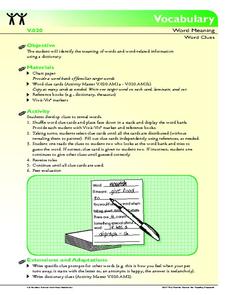Florida Center for Reading Research
Vocabulary: Word Meaning, Dictionary Digs
Young scholars dig through dictionaries to uncover the wealth of information they provide. Using the included graphic organizer, children learn about target words by finding their parts of speech, pronunciation, definition, synonyms, and...
Florida Center for Reading Research
Vocabulary: Word Meaning, Word Clues
Young learners develop a deeper understanding of target vocabulary. In pairs, pupils independently complete a series of word clue cards, asking them to find information about key terms, including their definitions, synonyms, antonyms,...
Curated OER
Alphabetical Order
This is a vocabulary worksheet with a twist! Young elementary-schoolers put these 13 words into alphabetical order before finding their meanings, uses, and origins. They will need to use reference materials, and may need some help...
Exploratorium
Exploratorium: Where Do Languages Come From?
A most interesting site! Explore why the French speak French in France and the English speak English in England and lots of other information on the history of words and languages.
TED Talks
Ted: Ted Ed: Mysteries of Vernacular: X Ray
The story of the word X-Ray is one of great thinkers. French philosopher Rene Descartes isolated the letters X, Y and Z to stand for unknowns, and centuries later, Wilhelm Rontgen discovered the X-ray, using the X for the unknown nature...
TED Talks
Ted: Ted Ed: A Brief History of Melancholy
If you are a living, breathing human being, chances are you have felt sad at least a few times in your life. But what exactly is melancholy, and what (if anything) should we do about it? Courtney Stephens details our still-evolving...
TED Talks
Ted: Ted Ed: Mysteries of Vernacular: Lady
Why do we call women ladies? Well, etymologically-speaking, the word comes from the Old English words for hlaf (bread) and daege (maid), which, combined, mean the female head of the household and eventually indicated high social...
TED Talks
Ted: Ted Ed: Speech Acts: Constative and Performative
When are words just words, and when do words force action? Linguist J.L. Austin divided words into two categories: constatives (words that describe a situation) and performatives (words that incite action). For instance, is a "No...
TED Talks
Ted: Ted Ed: Mysteries of Vernacular: Bewilder
The history of the word bewilder is more straightforward than you might think. Roots can be traced back to the Old English words wilde (undomesticated) and deor (untamed animals), eventually combined into the word wilderness. Jessica...
TED Talks
Ted: Ted Ed: Mysteries of Vernacular: Sarcophagus
Dating back to the early Roman Empire, the word sarcophagus originally referred to the limestone a coffin was made of, rather than the coffin itself. From flesh-eating stone to a stone coffin, Jessica Oreck and Rachael Teel unbury the...
TED Talks
Ted: Ted Ed: Mysteries of Vernacular: Fizzle
From a stinky and crude inception, the word fizzle's history is nothing to poo poo at. Jessica Oreck and Rachael Teel track the road from flatulence to its modern meaning of a failure or weak ending. [1:50]
TED Talks
Ted: Ted Ed: Mysteries of Vernacular: Jade
Now known for its beauty and green hue, the stone jade was previously thought to espouse magical properties, such as kidney treatment. Jessica Oreck and Rachael Teel explain the word's travels from 15th century to Spain to today. [2:07]
TED Talks
Ted: Ted Ed: Mysteries of Vernacular: Quarantine
Stemming from the days of bubonic plague in Medieval Europe, quarantines were originally used to prevent potentially plague-infested ships from disembarking at a port city. Jessica Oreck and Rachael Teel explain how the length of the...
TED Talks
Ted: Ted Ed: Mysteries of Vernacular: Gorgeous
From whirlpools and ravines to superlative beauty, what is the trajectory of the word gorgeous? Jessica Oreck and Rachael Teel reveal the surprising variations in meaning. [2:00]
TED Talks
Ted: Ted Ed: Mysteries of Vernacular: Window
Metaphoric compounds, like the combination of the words wind and eye to represent a window, populated Norse and Old English. Jessica Oreck and Rachael Teel describe how this love of metaphor created the word window. [1:57]
TED Talks
Ted: Ted Ed: Mysteries of Vernacular: Venom
How did venom get its poisonous meaning? Jessica Oreck and Rachael Teel follow venom from something to desire to explicit reasons for avoiding a snake. [2:02]
TED Talks
Ted: Ted Ed: Mysteries of Vernacular: Dynamite
With an explosive meaning, the word dynamite's past is as historical as it is etymological. Jessica Oreck and Rachael Teel describe how Alfred Nobel invented dynamite. [2:14]
TED Talks
Ted: Ted Ed: Mysteries of Vernacular: Inaugurate
From avian omens to the beginning of a new policy or the reign of a new politician, Jessica Oreck follows the flight path of the word inaugurate. [2:08]
TED Talks
Ted: Ted Ed: Mysteries of Vernacular: Earwig
An earwig is neither an ear nor a wig; it is an insect. Jessica Oreck and Rachael Teel explain how folklore gave this bug its name, combining entomology with etymology. [2:16]
TED Talks
Ted: Ted Ed: Mysteries of Vernacular: Tuxedo
How did tuxedo's roots extend from Native American history to black tie evening wear? Jessica Oreck reveals what the Delaware Indians and formal fashion have in common. [2:04]
TED Talks
Ted: Ted Ed: Mysteries of Vernacular: Miniature
Miniature's root may be Latin, but its meaning is rooted in books, where red pigment was used to denote chapter breaks. Jessica Oreck explains how we got from there to the meaning of miniature today: something smaller than others of its...
TED Talks
Ted: Ted Ed: Mysteries of Vernacular: Noise
The words noise, nausea, and naval all stem from the same Latin root. Jessica Oreck divulges how their spellings and meanings diverged from the original naus. [2:02]
Other
Dictionary.com
Dictionary.Com is an online dictionary. It provides definitions, syllabication, pronunciation, word origin, and part of speech. It also provides a word of the day, word games, and much more.
Other
Take Our Word for It
A bi-weekly Webzine of word origins. Includes a Spotlight word, answers to submitted questions, a curmudgeon's corner and other areas.

























